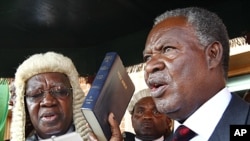Zambian Vice President Guy Scott has rejected criticism that President Michael Sata and leading members of the ruling Patriot Front (PF) entered politics to enrich themselves.
Scott says members of the administration are working hard to better the lives of all Zambians irrespective of their political affiliation.
In an interview with VOA, Vice President Scott says senior officials of the government are not interested in amassing wealth – a charge being made by members of the opposition.
“I can tell you that the party was founded on the premise to serve the people of Zambia, which sounds a bit corny. But we haven’t gone into this business to make money,” Scott said. “In fact, we would have been much better investing in something else because it has taken us 11 years to get into government and the appetite in getting into government has nothing to do with money.”
But some opposition party members have accused leading members of the administration of using their political office to enrich themselves, their families and close associates.
They cited recent political infighting within the Patriot Front as resulting from graft in Mr. Sata’s government. Scott disagrees.
He says both Justice Minister Wynter Kabimba and Defense Minister Geoffrey Mwamba were recently cleared by the Anti-Corruption Commission following allegations of corruption by opposition leaders.
“Unless you believe that we also have a corrupt Anti-Corruption Commission, I think you have to accept that a fair amount of noise was made and the noise turned into nothing,” said Scott.
Recently, the Coalition for the Defense of Democratic Rights (CDDR), which is made of political opposition and some civil society groups, has called for Zambia’s suspension from the Commonwealth. The group accused President Michael Sata and his administration of human rights violations and stifling democracy.
The group contends that the government uses state institutions such as the police and the anti-graft group to harass and intimidate opposition leaders.
At a news conference in South Africa, the leader of Zambia’s opposition United Party for National Development (UPND) said the administration is to blame for the simmering tension in the country.
“If you objectively look at the pattern of abuses committed by this government, not just against opposition parties, but also civil societies and business competitors of their allies, it is difficult not to conclude that we are on the road back toward the one-party state,” said UPND leader Hakainde Hichilema.
But Scott said the opposition parties are wrong.
“They should get their own house in order if they want to be an effective opposition with the hope of bouncing back into government,” Scott said. “They have their own inability to form a solid front and many of their problems are stemming from that.”
Scott says members of the administration are working hard to better the lives of all Zambians irrespective of their political affiliation.
In an interview with VOA, Vice President Scott says senior officials of the government are not interested in amassing wealth – a charge being made by members of the opposition.
“I can tell you that the party was founded on the premise to serve the people of Zambia, which sounds a bit corny. But we haven’t gone into this business to make money,” Scott said. “In fact, we would have been much better investing in something else because it has taken us 11 years to get into government and the appetite in getting into government has nothing to do with money.”
But some opposition party members have accused leading members of the administration of using their political office to enrich themselves, their families and close associates.
They cited recent political infighting within the Patriot Front as resulting from graft in Mr. Sata’s government. Scott disagrees.
He says both Justice Minister Wynter Kabimba and Defense Minister Geoffrey Mwamba were recently cleared by the Anti-Corruption Commission following allegations of corruption by opposition leaders.
“Unless you believe that we also have a corrupt Anti-Corruption Commission, I think you have to accept that a fair amount of noise was made and the noise turned into nothing,” said Scott.
Recently, the Coalition for the Defense of Democratic Rights (CDDR), which is made of political opposition and some civil society groups, has called for Zambia’s suspension from the Commonwealth. The group accused President Michael Sata and his administration of human rights violations and stifling democracy.
The group contends that the government uses state institutions such as the police and the anti-graft group to harass and intimidate opposition leaders.
At a news conference in South Africa, the leader of Zambia’s opposition United Party for National Development (UPND) said the administration is to blame for the simmering tension in the country.
“If you objectively look at the pattern of abuses committed by this government, not just against opposition parties, but also civil societies and business competitors of their allies, it is difficult not to conclude that we are on the road back toward the one-party state,” said UPND leader Hakainde Hichilema.
But Scott said the opposition parties are wrong.
“They should get their own house in order if they want to be an effective opposition with the hope of bouncing back into government,” Scott said. “They have their own inability to form a solid front and many of their problems are stemming from that.”
